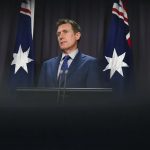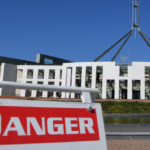Merchants of death

In November 2022, Australia’s Minister for Health Mark Butler announced plans to introduce new legislation featuring a raft of tobacco control measures. The ‘Reignite the Fight Against Tobacco Addiction’ reform package includes eleven measures that will see warning labels on individual cigarettes; standardisation of the size of tobacco packets and products; new requirements for pack and pouch sizes to make roll-your-own tobacco less affordable and appealing; and the closure of loopholes that have allowed the tobacco industry to promote and market its products.
These reforms were welcomed by the public health community. They are long overdue and have the potential to bring down smoking rates. But the fight isn’t just against tobacco and nicotine addiction. It is also against an industry that works to maintain the profits of its shareholders by keeping people addicted to a product that is known to kill them.
The tobacco industry has a long history of interfering in public health policy, with this interference a commonly cited challenge among experts. Many express concerns that a well-resourced tobacco industry continues to oppose strengthened regulatory reforms, exploit loopholes in current legislation and undermine tobacco control laws.
In the words of one expert, ‘A special problem with tobacco, probably more than any other harmful industry, is an extraordinarily powerful and determined industry that uses every possible weapon and ally … to oppose, delay, undermine any kind of action, to attack people who are pressing for action and simply to outlive its opposition while promoting, constantly promoting, its product … But in my view too, in recent years, we’ve seen the industry as, if anything, resurgent. They were on the back foot in many ways. Now what we’re seeing is the industry running globally, company by company and jointly, the biggest counterattack that I’ve ever seen’.
Industry lobbying is a big issue. Despite Australia being a signatory to the World Health Organization’s Framework Convention of Tobacco Control, some Australian political parties continue to accept tobacco industry donations — breaching the convention’s obligations.
The Australian Senate Tobacco Harm Reduction Inquiry conducted in 2020 is a case study of industry influence. The Inquiry focussed on e-cigarettes instead of evidence-based tobacco control measures, likely in part due to industry lobbying. An investigative piece by Neil Chenoweth published in the Australian Financial Review exposed strong industry interference in this inquiry.
It comes as no surprise then that industry’s ‘aggressive’ and ‘relentless’ lobbying to influence public health policy is considered a major challenge by many experts. The emergence of e-cigarettes provides an opportunity for the tobacco and vaping industries to claim that they desire a smoke-free world while simultaneously arguing for e-cigarettes to be considered consumer goods and openly available to non-smokers, creating a new generation addicted to nicotine. Legitimising the tobacco industry’s narrative that it is a part of the solution to reducing tobacco use allows the industry to circumvent the Framework Convention of Tobacco Control.
Industry attempts to influence scientific evidence is another serious problem. Third-party organisations and academics are funded by industry to produce research, with outcomes sympathetic to industry agendas. These findings are then published in academic journals. Some of these papers fail to declare all conflicts of interest, while in others these conflicts are downplayed.
Vested interests have a legal obligation to shareholders to maximise investor returns, and influencing public policy is a means by which this obligation can be met — even at the expense of public health. The Government will need every support if it is to succeed in upholding Australia’s obligations under the Framework Convention of Tobacco Control and introduce the evidence-based reforms it proposes.
After a decade-long fight to ensure that plain packaging was a part of Australia’s tobacco control strategy, we can expect the tobacco industry to once again throw its enormous resources into lobbying against new measures that it knows will reduce tobacco sales. That fight is now on.
This article was published by the East Asia Forum.
Associate Professor Michelle Jongenelis has expertise in health promotion, intervention development and evaluation, behavioural psychology, and clinical psychology. She works across multiple and diverse health-related behaviours including alcohol and tobacco control, nutrition, physical activity, and sun protection.













